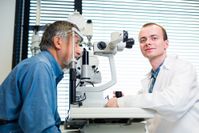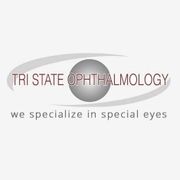Age-Related Eye Conditions: Signs & Risk Factors of Macular Degeneration

Age-related macular degeneration, also known as AMD, is the biggest culprit in vision loss among adults over the age of 60 in the United States. AMD often advances so slowly that people do not know they have it. The experts at Tri-State Ophthalmology offer testing and treatment for AMD among other eye conditions. The eye doctors there have shared their insight into the early signs and risk factors of AMD to help you be prepared.
Macular Degeneration: The Early Signs
As its name suggests, age-related macular degeneration damages the macula. This is a small spot near the center of the retina consisting of millions of light-sensing cells that allow you to see directly in front of you. As a result, you may notice the below early signs when you try to look straight ahead:
 You notice a dark blind spot in the center of your field of vision.
You notice a dark blind spot in the center of your field of vision.- When you look at a line or object with a straight edge, it appears crooked or otherwise distorted.
- Your vision becomes generally blurred.
Macular Degeneration: The Risk Factors
There are some risk factors for AMD that you cannot control, such as genetics. However, there are some lifestyle-based factors that you can avoid in order to reduce your possibility of developing macular degeneration:
- Smoking is a risk factor. Avoid smoking or quit the habit if you are a current smoker.
- High blood pressure and an unhealthy weight are both risk factors. Try to maintain an active lifestyle by exercising daily.
- A lack of balanced nutrition also increases your chances of developing the condition. Keep a diet high in nutrition-rich food, particularly those with omega-3 fatty acids, which are proven to support eye health. Some examples of such foods are leafy greens, such as kale and spinach, and fish.
As you get older, your risk for eye conditions and other vision problems increases dramatically. In addition to staying educated on potential issues, the best action you can take is to schedule regular eye exams. Call (606) 324-2452 to schedule an appointment with Tri-State Ophthalmology and visit their website for more information on age-related macular degeneration.
About the Business
Have a question? Ask the experts!
Send your question

